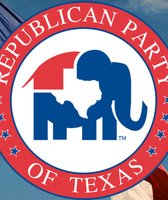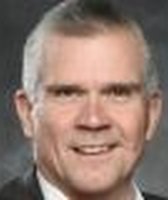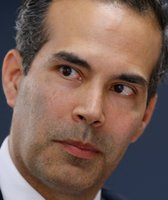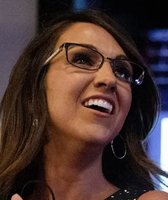Get PolitiFact in your inbox.
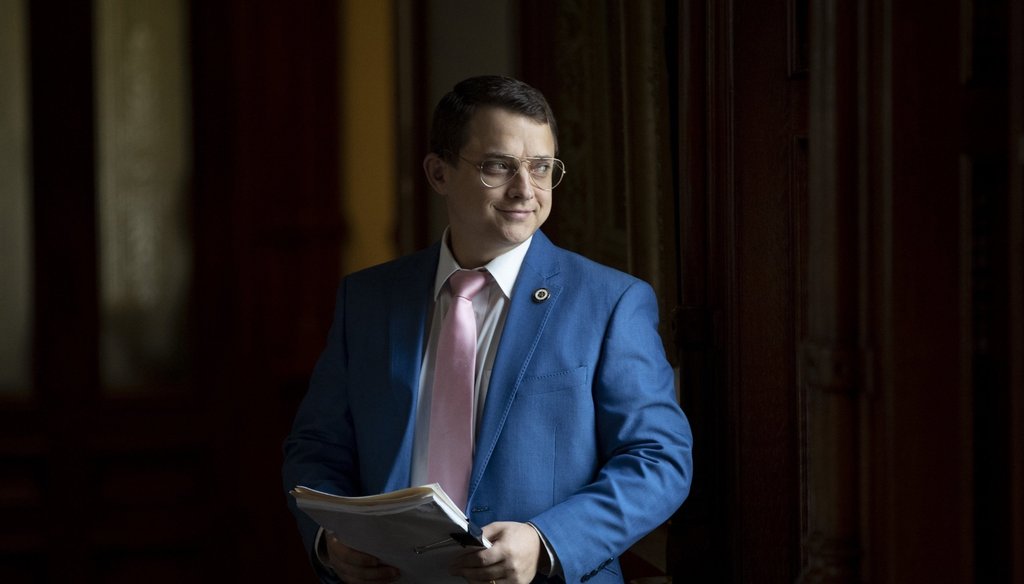
State Rep. Briscoe Cain, R - Deer Park, waits on the House floor for the start of the debate of Senate Bill 7, known as the Election Integrity Protection Act, at the Capitol on Sunday May 30, 2021, in Austin, Texas. (Jay Janner/Austin American-Statesman)
Texas Democrats' boldest action this legislative session came in the 11th hour of the second-to-last day of the 140-day gathering. In a discrete but dramatic walkout from the House floor, they left the Republicans’ sweeping overhaul of Texas election laws to expire as the shot-clock wound down — at least for now.
The last-minute maneuvering from state Democrats, who haven’t controlled a single branch of power since 2002, bore a striking resemblance to the political gamesmanship of 2013, when state Sen. Wendy Davis, D-Fort Worth, led a marathon filibuster to run out the clock on a restrictive abortion bill. The similarity even struck Gov. Greg Abbott.
"The last time a stunt like this happened was... Wendy Davis. We all know how that story ended," Abbott tweeted, referring to the revival of the anti-abortion bill in a second special session that ultimately saw its passage. (Years later, the U.S. Supreme Court struck it down.)
Abbott already has vowed to convene a special session to revive Senate Bill 7, known as the Election Integrity Protection Act of 2021, and other legislative priorities that went down with it.
SB 7 was introduced by Republican Sen. Bryan Hughes, who has emphasized voter fraud concerns in Texas, though he has overstated the problem by citing the number of cases being investigated, not the actual number of prosecutions. Its House version was carried by Rep. Briscoe Cain, a firebrand Republican who notably flew to Philadelphia in the days after the presidential election to help the Trump campaign seek to overturn election results.
The bill was initially introduced as 23 pages of changes to the state’s election code that Democrats argued would restrict early voting access in ways that would disproportionately impact people of color. Republicans argued that it was simply a measure to restore people’s faith in elections.
But by Saturday, Republican leaders unveiled a new version of SB 7 after private negotiations among Republicans from the House and Senate. The new version, which added another 23 changes that expanded the bill to 67 pages, took Democrats by surprise.
"Some of these (changes) were never heard in committee, and the public never got the opportunity and nor did the committee members get the opportunity to hear these changes," said Rep. Jessica González, D-Dallas, on the House floor Sunday.
The expanded iteration of the bill is more sweeping than the original version. Here we review the major changes the original bill would make to voting access and the major new changes Republicans tacked on to it in the session’s final weekend.
Many of the major changes SB 7 would make to the state election code target Harris County, which increased voting access during the early voting period ahead of the November election in ways responsive to the coronavirus pandemic.
Election officials in the state’s largest county opened eight 24-hour polling centers in areas with high numbers of overnight workers — near Houston's medical center and ship channel. The county also opened drive-thru voting locations during early voting to allow people to vote without having to leave their car. Nearly 145,000 Texans availed themselves of these new voting options, which helped the county surpass its all-time record for number of votes cast before the early voting period was over.
Texas Lt. Gov. Dan Patrick railed against these measures, arguing that county officials came up with these methods "out of thin air" and that they weren't explicitly allowed by state law. County officials counter that nothing in the law precluded 24-hour voting or drive-thru locations, and several legal challenges last year to the expanded voting methods were unsuccessful.
SB 7 would codify Republicans' objections to drive-thru voting and 24-hour voting into the state election code by:
• Banning drive-thru voting or polling places inside tents or other temporary structures, with no voting allowed from inside a vehicle except by those with a disability who qualify for curbside voting. An analysis of the county’s early voting rosters conducted by the Texas Civil Rights Project shows that people of color used the drive-thru voting sites at higher rates than whites. Patrick responded to arguments that this change would disproportionately impact people of color by claiming that "statistics show that more people of color don't have cars than not. So how do (drive-thru voting centers) help those folks?" PolitiFact rated his claim False.
• Banning 24-hour voting or extended hours for in-person voting by mandating that voting centers could open no earlier than 6 a.m. and close no later than 9 p.m.
Other changes would tighten rules on mail-in ballots by:
• Requiring election officials to send vote-by-mail applications only to voters who request one. Government officials who violate the restriction could be charged with a state jail felony and be sentenced to up to two years in jail.
• Banning election officials from sending voter registration applications to prospective voters with their name and address filled in, a strategy that advocates say increases the likelihood of registration.
• Requiring people who vote by mail to include their driver's license number, their state ID number or the last four digits of their Social Security number on the inner envelope. Ballots would be rejected if the numbers aren't included or do not match what the voter listed on the vote-by-mail application.
• And the bill also broadens access for partisan poll watchers to monitor polling locations, including giving poll watchers the ability to record voters receiving assistance from poll workers if the poll watcher believes the assistance is unlawful. Opponents of SB 7 have argued this measure can lead to voter intimidation.
Republicans' late additions made a sweeping elections bill even more sweeping. The bill’s length had more than doubled with new requirements and penalties across the entire voting process.
Some of those additions created new restrictions for anyone providing assistance to a voter by:
• Requiring anyone who drives three or more people to the polls for curbside voting to provide their name and address on a form provided by an election worker and indicate whether they are also providing help to a voter based on a disability. Drivers related to all passengers would be exempt from this rule.
• Requiring anyone who helps another person cast an in-person ballot due to a physical limitation or language barrier fill out a form listing their name, address and relationship to the voter and saying whether they accepted money or another benefit from "a candidate, campaign, or political committee."
The bill also increases penalties for election workers who violate rules.
• Vote harvesting, defined as receiving compensation for interacting with voters with the intent to deliver votes for a specific candidate or ballot measure, would be a third-degree felony punishable by two to 10 years in prison.
Elections officials who count invalid votes or reject valid ballots could be prosecuted for a state jail felony.
• Republicans added language that could make it easier for a judge to overturn an election "if the number of votes illegally cast in the election is equal to or greater than the number of votes necessary to change the outcome of the election." On these grounds, a judge could void election results if there is a preponderance of evidence that fraud occurred, which is a lower standard than having to show proof beyond a reasonable doubt.
Lastly, SB7 would prohibit polling places from opening before 1 p.m. on the last Sunday of early voting. This measure appeared to target "Souls to the Polls" events, a longstanding tradition among Black churches where congregations vote after worship services.
Republicans initially defended this measure, arguing that it was intended to allow election workers to go to church, too.
"Those election workers want to go to church, too," Hughes said on Saturday, according to the Texas Tribune. "And so that's why it says 1 p.m. (and) no later than 9 p.m. You can make Sunday service and go after that."
But this week Republicans changed the story. The Sunday requirement was due to a clerical error, Rep. Travis Clardy, R-Nacogdoches, first revealed in a Tuesday morning NPR interview with Steve Inskeep.
"That's one of the things I look forward to fixing the most (in special session)," Clardy said. "Call it a scrivener's error or whatever you want to, but I talked to our team yesterday to regroup what happened. That was not intended to be reduced. What should have been 11 got printed up as 1. So we intended to have extended hours instead of 7 to 7 in most locations."
In an interview later that day, Clardy, who co-chaired the House Elections Committee, said it was too late to change the error by the time the bill made it to the House floor.
"There were a lot of people and a lot of pressure to get a lot of things done — this was not the only bill up on Sunday night. … We were jammed up," Clardy said.
According to him, the error originated with the Texas Legislative Council, the agency that assists legislators with bill drafting, policy analysis and research. Legislators had already flagged the error in their private meetings, but the council didn’t correct it before the final version was engrossed, he said.
Nonetheless, with a looming deadline, Republicans pushed ahead with the error included.
"You can’t let perfect be the enemy of good," Clardy said. "We want it to be perfect, don’t misunderstand me. But I’m frustrated by how long it took to get this bill set so that we could avoid some of the last-minute push."
"When that election integrity bill is brought back up in special session, I promise you it’s going to say 11 o’clock," he said.
Our Sources
Houston Chronicle, Fact-checking Texas lawmaker’s claim of 400 voter fraud ‘cases,’ April 13, 2021
Austin American-Statesman, GOP unveils final version of Texas elections bill, which includes more restrictions, May 29, 2021
LegiScan, TX SB7 as engrossed, May 30, 2021
LegiScan, TX SB7 as introduced, March 11, 2021
Texas Tribune, Here's how Texas elections would change, and become more restrictive, under the bill Texas Republicans are pushing, April 21, 2021
Texas Tribune, Republicans say they’ll tweak part of Texas elections bill criticized for impact on Black churchgoers, June 1, 2021
PolitiFact Texas, Yes, the Texas Senate's election bill SB7 changes early voting rules, April 9, 2021
PolitiFact Texas, In voting debate, no evidence that more people of color don't own cars than do, April 23, 2021
Phone interview with State Rep. Travis Clardy, June 1, 2021
NPR, Texas Governor Vows Action After Democrats Walk Out Over Voting Bill, June 1, 2021














